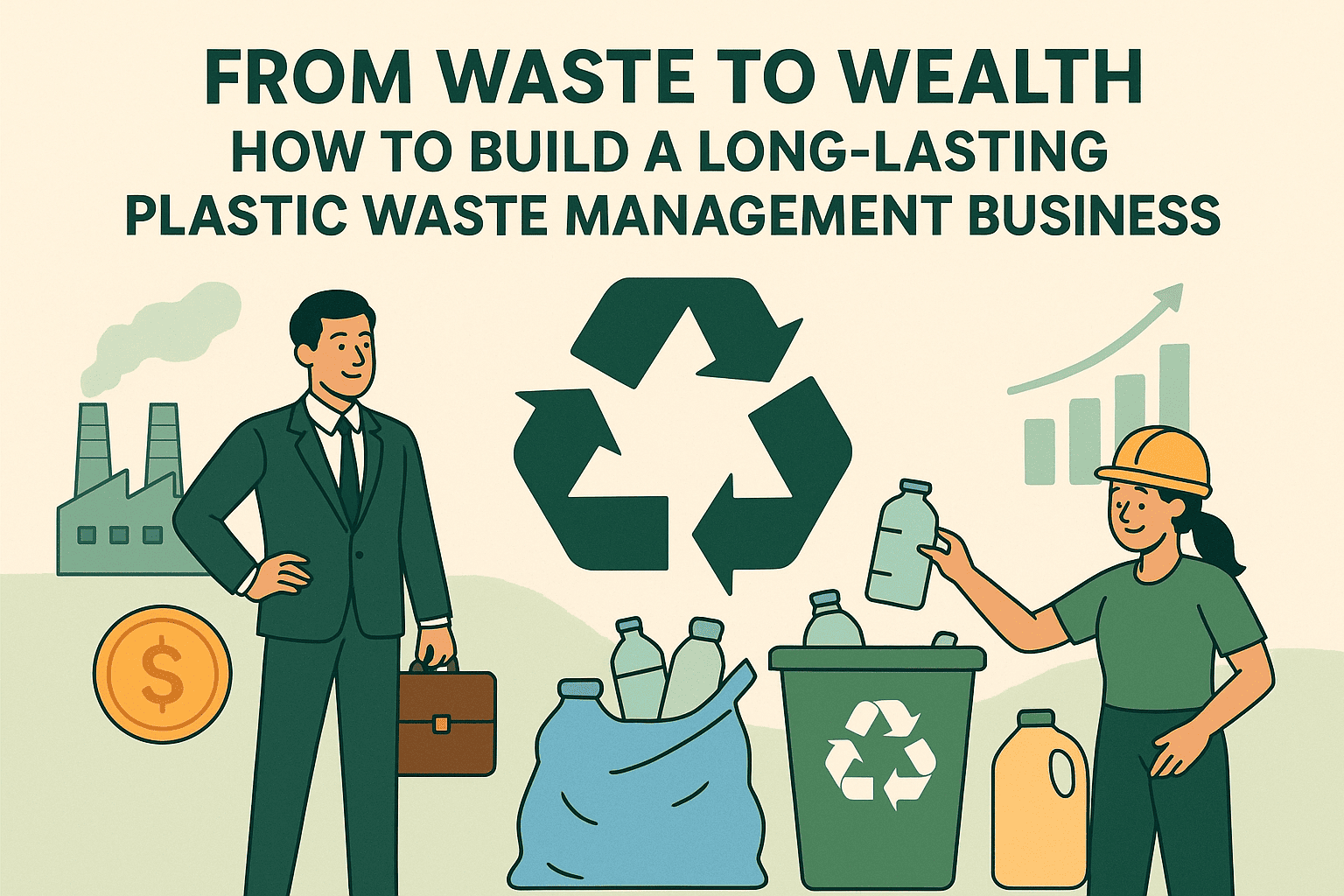The plastic waste management business is no longer just about recycling—it’s about building a profitable, sustainable model that serves industries, communities, and the environment. For business owners, this sector offers both financial potential and long-term growth opportunities. As global regulations tighten and consumer demand for eco-friendly solutions rises, the time to establish your own venture is now. In this guide, we’ll explore the essential steps—from market research to niche selection—that can help you turn plastic waste into wealth.

Understand the Market Before You Start
To succeed in plastic waste management, you need more than just recycling machinery—you need market intelligence.
Why Market Research Is Crucial
Market research helps you identify:
- The current supply of plastic waste in your target area
- The industries generating the most waste (e.g., packaging, manufacturing)
- Potential clients such as plastic waste business owners, municipal corporations, or manufacturing units needing recycled raw materials
Example: In India, the demand for recycled PET bottles has grown by over 12% annually due to beverage companies aiming to meet sustainability targets.
Quick Checklist:
- Study local regulations and government recycling incentives
- Track industry trends for plastic waste recycling demand
- Connect with trade associations to understand price fluctuations
Build a Business Plan That Investors Can Trust
A strong business plan is your blueprint for success.
What to Include in Your Plan
- Business Goals: Profit targets, market share, and impact metrics
- Operational Strategy: How waste will be collected, sorted, and processed
- Financial Projections: Break-even analysis and ROI timelines
- Risk Management: Plan for price volatility in recycled plastic markets
💡 Pro Tip: Include a section on EPR (Extended Producer Responsibility) partnerships—many manufacturers are willing to outsource their recycling compliance.
[Explore: Best business blogs for operational strategy insights]
Find Your Niche in the Plastic Waste Industry
The most successful companies don’t handle all types of plastic waste—they specialize.
Common Niches in Plastic Waste Management
- PET Bottle Recycling: High demand in beverage and textile industries
- LDPE Film Recycling: Sought after for manufacturing plastic bags and sheets
- HDPE Containers: Used in packaging for chemicals, detergents, and cosmetics
- Upcycled Products: Creating eco-friendly products like bags, tiles, or furniture from waste plastic
💡 Case Example: A small recycling unit in Pune turned discarded LDPE films into eco-friendly shopping bags, increasing profit margins by 35% compared to bulk recycling.
Choose Your Recycling Method Strategically
Your chosen process will define your investment size, profit margins, and operational complexity.
Main Recycling Methods
Mechanical Recycling:
- Shredding, washing, melting, and remolding plastic
- Lower cost, but product quality depends on feedstock purity
Chemical Recycling:
- Breaking down plastic into monomers for reuse
- Higher investment, but produces near-virgin quality material
💡 Insider Tip: Combining mechanical and chemical processes can open multiple revenue streams.
Build Strategic Partnerships for Growth
You can’t scale a plastic waste management business alone. Strategic partnerships can accelerate your reach and profitability.
Partnership Opportunities
- Municipal Corporations: For regular waste supply contracts
- Large Manufacturers: For EPR compliance collaborations
- Logistics Companies: To optimize collection and transportation
- Export Partners: For selling recycled pellets to global markets
💡 Real-World Insight: Partnering with logistics companies can reduce operational costs by up to 20%.
[Explore: open marketplace for recycling trade opportunities]
Leverage Technology for Efficiency
From AI-powered sorting systems to blockchain-based waste tracking, technology can give you a competitive edge.
High-Impact Tools
- AI Sorting Machines: Identify plastic types faster and more accurately
- IoT Sensors: Monitor collection bins in real time
- Blockchain Tracking: Create transparency for clients on recycled volumes
💡 Future Outlook: With concepts like web3 shopping India, blockchain-enabled supply chains could become standard in the waste sector.
Marketing & Branding for Long-Term Positioning
Even in a B2B sector, branding matters. Clients want to work with reliable, credible waste partners.
Branding Essentials:
- Professional website with recycling process transparency
- Industry certifications and environmental compliance badges
- Participation in sustainability forums and exhibitions
Position Yourself as an Expert: Publish case studies, whitepapers, and video content on your recycling innovations.
Compliance & Sustainability Reporting
Meeting legal requirements isn’t optional—compliance is your license to operate.
Key Regulations to Monitor:
- Plastic Waste Management Rules (India, 2016 and amendments)
- Local municipal guidelines for waste segregation and processing
- International export compliance for recycled materials
Client Trust Booster: Share annual sustainability reports highlighting waste diverted from landfills.
Conclusion – Turning Vision into Reality
The plastic waste management business is a high-impact, high-potential venture for entrepreneurs willing to blend profit with purpose. With the right market research, niche focus, technology adoption, and partnerships, you can create a business that not only survives but thrives for decades.Action Step: Start by mapping your local waste ecosystem this week. Identify one niche and draft your first collection-to-processing plan.